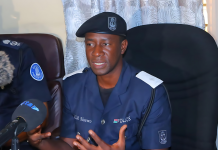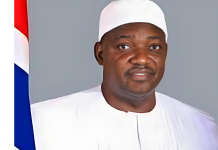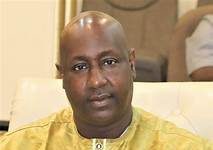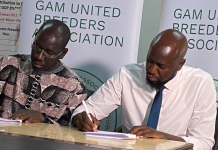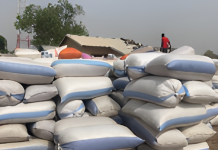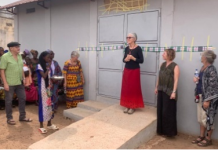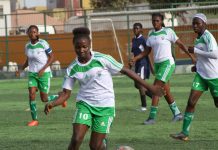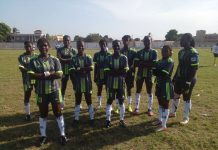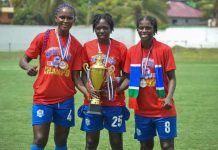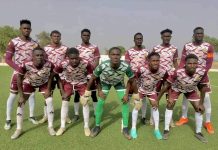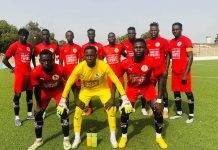By Nelson Manneh
A book titled “The Impact Of French Language On The Wolof Spoken In The Greater Banjul Area”, authored by Sheikh Tijan M.D.  Salla, was launch at the Alliance Franco on Friday, 15 April 2016.
Salla, was launch at the Alliance Franco on Friday, 15 April 2016.
In his introduction of the author, Mustapha Alex Dacosta, the Master of Ceremony (MC), said he was his classmate at Gambia High School and was a very bright arts student who was also good in languages. He said Mr. Salla who always strives for academic excellence is a linguist and scholar.
“This is not a surprise for me for Tijan to write a book,” added Mr. Dacosta.
He described the book as a master piece that can be read in few weeks or days as it is short and reader-friendly and also easy to digest.
Alhaji Ebou Momar Tall, a former Gambian diplomat for many years, in his remarks, said Mr. Salla’s skills in writing is an inheritance from his father who has been a good writer in his days. He also said that it is no surprise that the son of M.D. Salla, a master educationalist who had mentored or trained so many Gambians and cherished scholarship, would produce a literary work.
On his relation with the author, he said they have crossed paths in many ways at both the professional and personal levels.
Mr. Taal said Gambia has a long way to go when it comes to writing books and that this effort by Tijan will contribute to the enrichment of scholarly works.
He also challenged the author to continue to research and search for answers as it is not only French that has influenced the Wollof language but also Arabic.
In his review of the book on behalf of Dr. Pierre Gomez, the Dean of the Faculty of Arts and Sciences at the University of The Gambia (UTG), Mr. Abdul Karim Camara, a University lecturer, said the book which is written by the son of the soil contains 26 chapters and 103 pages. He said the book contains 206 Wollof words which were derived from the French.
“What comes strange is that the Gambia was colonized by the British but with this book more of French words are spoken in this local language,” he noted.
He added that more than 30 percent of the words spoken by the Wollof in the Greater Banjul Area is borrowed from the French language.
Mr. Camara said the English should have dominated the Wollof spoken in a country colonized by the British and not the French.
The reviewer said the aim of the book is to show that the French were physically present in Bathurst (now Banjul) during the colonial period.
On the contents of the book, the reviewer cited many words that have been borrowed which starts from what the person says or does every day from the morning until he/she retires to bed in the evening.
Starting with the first activity in the morning, words and phrases like “matla”, “pajas”, “darap”, “sarbet”, “duus”, “sio ndox”, etc. are all derived from the French language but corrupted or distorted over the years in such a way that the originality becomes obscure.
On the second chapter on Baby-Sitting, the words like “bambaane”, “waxambaane”, “teete”, “raam”, “biberong”, “neene”, “wen”, “poti sambur”, the list goes on, are all from French.
The diphtongal challenges or inability of the Wollof speaker, who is not literate in the Western sense, to pronounce such letters as “v” which they use as “w” or “b” also account for this distortion of the correct pronunciation of these words.
Mr. Camara said the Wolof language is widely spoken in the sub-region.
He also challenged Mr. Salla and the other writers to also look into how the Temne language finds its way into Wollof as well as the Portuguese influence on the Mandinka language.
Mr. Hassoum Ceesay of the National Centre for Arts and Culture (NCAC) and a renowned histirian, who represented the government, applauded the initiative and urged more Gambians to take up the literary challenge.
In her formal launch statement, Mrs. Juka Jabang, long serving retired civil servant and now head of the West African International School, commended the author for producing such a good work. She described the book as “must read”.
She encourages Gambians to embark on writing their own culture. “We should not allow other people to write our culture for us,” she challenged.
Mrs. Jabang said the reason why others are advanced and ahead of us is because they believe in research and writing or recording their history for posterity.
She urges Mr. Salla to continue with his research and writing in finding the answers to the questions he is raising in the book.
For his part, Mr. Salla, the author, thanked all those who attended the event and encouraged him to write the book. He said it was his father who first inspired him to write such a book. He thanked his parents of blessed memory, siblings and friends who have been very pivotal in their encouragement for this project to become a reality. He promised to continue with his research in finding for answers and producing more literary works.


